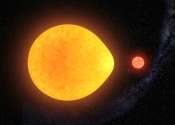CERN lab on the hunt for dark matter
Europe's physics lab CERN on Tuesday said it was planning a new experiment to look for particles associated with dark matter which is believed to make up some 27 percent of the universe.

Europe's physics lab CERN on Tuesday said it was planning a new experiment to look for particles associated with dark matter which is believed to make up some 27 percent of the universe.
General Physics
Mar 5, 2019
64
1599

Geologists have long thought tectonic plates move because they are pulled by the weight of their sinking portions and that an underlying, hot, softer layer called asthenosphere serves as a passive lubricant. But a team of ...
Earth Sciences
Mar 11, 2021
3
4958

One of the biggest puzzles in physics is that eighty-five percent of the matter in our universe is "dark": it does not interact with the photons of the conventional electromagnetic force and is therefore invisible to our ...
General Physics
Nov 25, 2016
21
1454

A star that pulsates on just one side has been discovered in the Milky Way about 1500 light years from Earth. It is the first of its kind to be found and scientists expect to find many more similar systems as technology to ...
Astronomy
Mar 9, 2020
0
9100

Black holes are surrounded by many mysteries, but now researchers from the Niels Bohr Institute, among others, have come up with new groundbreaking theories that can explain several of their properties. The research shows ...
Astronomy
Dec 11, 2012
86
0

(Phys.org) —For many years scientists have believed that our Galaxy, the Milky Way, is set to crash into its larger neighbour, the Andromeda Galaxy, in about 3 billion years' time and that this will be the first time such ...
Astronomy
Jul 4, 2013
34
0

(PhysOrg.com) -- Black holes are my constant companions, at least in my imagination. Starting back a couple of decades ago, two sets of basketball tickets disappeared into one of them, and since then a pair of ski gloves, ...

Since the 1970s, astronomers and physicists have been gathering evidence for the presence in the universe of dark matter: a mysterious substance that manifests itself through its gravitational pull. However, despite much ...
Astronomy
Oct 5, 2018
71
386

With its successful test run at the end of 2009, the Large Hadron Collider near Geneva, Switzerland, seized the world record for the highest-energy particle collisions created by mankind. We can now reflect on the next questions: ...
General Physics
Jan 7, 2010
23
0

A team of oceanographers at the Scripps Institution of Oceanography, working with a colleague from Chungnam National University and another from the University of Hawaii, has mapped 19,000 previously unknown undersea volcanoes ...